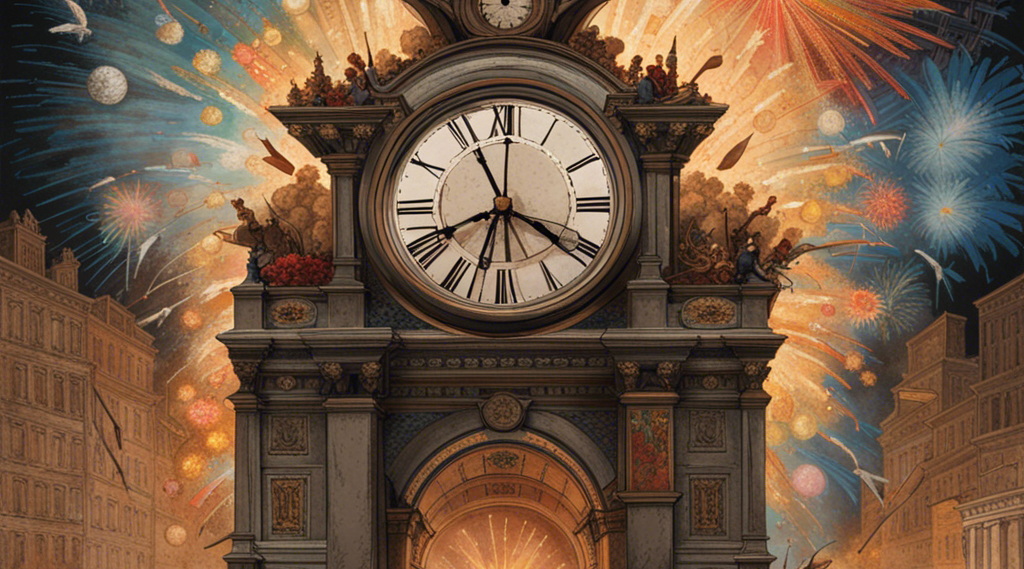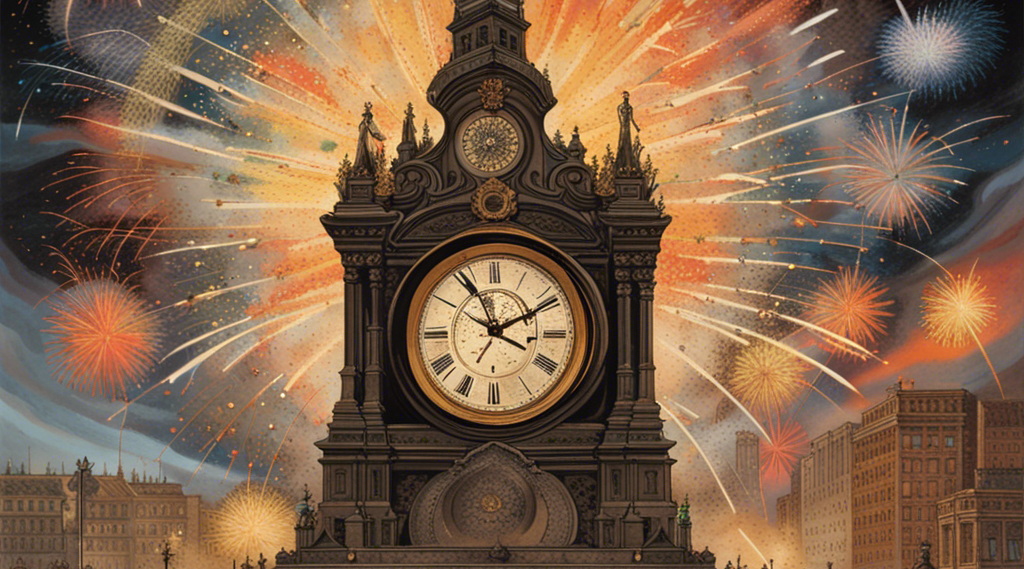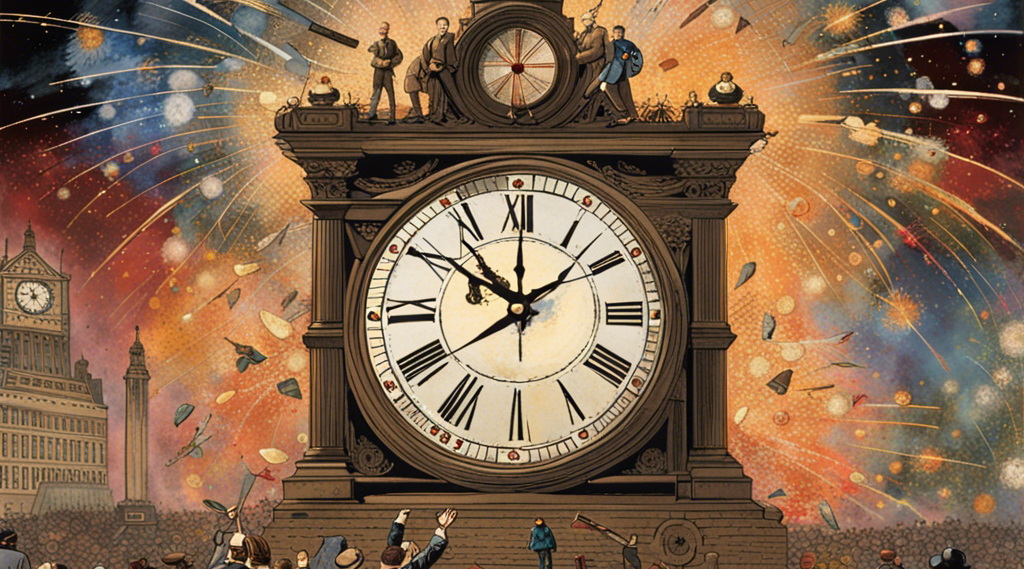
Chapter 1 What’s Year Zero
"Year Zero: A History of 1945" by Ian Buruma is a book that examines the profound impact and historical significance of the year 1945. This pivotal year marked the end of World War II and witnessed various dramatic events that reshaped the world order.
The book explores the aftermath of the war, focusing on the experiences and challenges faced by different individuals and nations in the immediate post-war period. Buruma delves into the social, political, and cultural transformations that occurred during this time, providing a nuanced understanding of the consequences of the war's conclusion.
"Year Zero" goes beyond traditional historical accounts by examining not only the major world powers involved but also lesser-known regions and individuals affected by the war. It explores how societies coped with the legacy of conflict, addressing issues such as the trials of war criminals, the displacement of populations, and the struggle for independence in former colonies.
Buruma delves into important themes like reconstruction, the establishment of new governments, economic recovery, and the beginning of the Cold War. Through a combination of personal stories, political analysis, and historical context, the book provides a comprehensive look at the complex and multifaceted year of 1945.
Overall, "Year Zero: A History of 1945" offers readers a thought-provoking exploration of the aftermath of World War II, shedding light on the challenges, triumphs, and lasting consequences of this transformative year in human history.
Chapter 2 Is Year Zero Valued
According to reddit comments on Year Zero, Year Zero: A History of 1945 by Ian Buruma is highly valued among readers and historians. The book provides a comprehensive account of the pivotal year following World War II, exploring the aftermath of the war and the profound changes it brought to different parts of the world. Buruma's work has been praised for its thorough research, insightful analysis, and engaging storytelling. It offers a unique perspective on the global impact of the war and its consequences, making it a valuable resource for those interested in understanding this crucial period in history.
Chapter 3 Year Zero Abstract
In this captivating article, we delve into the insightful pages of Ian Buruma's book "Year Zero: A History of 1945." As we explore the profound depths of this historical masterpiece, we encounter a comprehensive narrative that unravels the significant events and transformative consequences of the year following World War II. Buruma's meticulous research and engaging storytelling make "Year Zero" an essential read for anyone seeking to understand the profound impact of 1945 on the course of human history.

Chapter 4 Author of Year Zero
Ian Buruma is a prominent writer, editor, and scholar known for his work on contemporary Asian culture and history. He was born in the Netherlands in 1951 and has had an extensive career in journalism and academia.
Buruma studied Chinese literature at Leiden University before moving to Japan in the early 1970s, where he worked as a film critic and documentary filmmaker. His experiences in Japan greatly influenced his later writings on Asian culture and society.
As a versatile writer, Buruma has authored numerous books covering a wide range of topics. Many of his works explore themes related to Japan, China, and the broader East Asian region. Some notable titles include "Behind the Mask: On Sexual Demons, Sacred Mothers, Transvestites, Gangsters, Drifters, and Other Japanese Cultural Heroes" and "Inventing Japan: From Empire to Economic Miracle."
Buruma has also written extensively about political and historical events. His book "Year Zero: A History of 1945" examines the aftermath of World War II and its impact on various countries. Another important work, "Murder in Amsterdam: The Death of Theo van Gogh and the Limits of Tolerance," analyzes the social and political tensions surrounding the murder of Dutch filmmaker Theo van Gogh in 2004.
Aside from his writing, Buruma has held numerous editorial positions. He served as the editor of The New York Review of Books from 2017 to 2018, and prior to that, he was a regular contributor and editor of The New Yorker. These roles have allowed him to engage with a broad range of intellectual and cultural issues.
Ian Buruma's work has earned him recognition and acclaim, including awards such as the Erasmus Prize and the Shorenstein Journalism Award. Through his insightful and thought-provoking contributions, he continues to enrich our understanding of Asia's complex history, culture, and contemporary issues.
Chapter 5 Year Zero Meaning & Theme
1. Year Zero the Meaning
"Year Zero: A History of 1945" by Ian Buruma is a book that explores the historical significance and transformative nature of the year 1945. The term "Year Zero" refers to the idea that, in many ways, 1945 marked a new beginning for the world after the devastation of World War II.
The book focuses on various aspects of the post-war period, examining the political, social, cultural, and economic changes that took place globally. It delves into the impact of the end of the war, the collapse of empires, the emergence of new nations, and the shifting power dynamics among countries.
Buruma explores how the events of 1945 shaped the subsequent years and set the stage for the Cold War, decolonization, the establishment of the United Nations, and the rebuilding of war-torn societies. He also examines the personal experiences of individuals during this time, capturing the sense of hope, despair, and uncertainty that prevailed.
Overall, "Year Zero: A History of 1945" offers a comprehensive account of a pivotal moment in history, emphasizing its lasting effects and the profound changes it brought to the world.
2. Year Zero the Theme
The theme of "Year Zero: A History of 1945" by Ian Buruma revolves around the transformative nature of the year 1945 and its profound impact on global history. The book explores the aftermath of World War II, focusing on the political, social, cultural, and psychological changes that occurred during this pivotal year.
One major theme is the concept of "Year Zero," which refers to the idea that 1945 marked a complete break with the past. The war had devastated countries, caused immense human suffering, and altered the geopolitical landscape. Buruma examines how societies across the world grappled with the challenges of rebuilding their nations and reshaping their identities in the wake of such destruction.
Another key theme is the complex process of reckoning with the war's legacy. Buruma delves into how different nations confronted their wartime actions, atrocities, and collaboration, highlighting the efforts to come to terms with guilt, responsibility, and the need for justice. He also explores the emergence of new narratives and historical interpretations that aimed to shape collective memory and influence future generations.
The book further explores the ideological shifts that took place in 1945. Buruma discusses the rise of the United States and the Soviet Union as superpowers, the beginning of the Cold War, and the tensions that arose from competing ideologies. He also analyzes the struggles for independence and self-determination in colonized nations, as well as the changing dynamics of power within Europe.
Overall, "Year Zero: A History of 1945" emphasizes the significance of this particular year in shaping the modern world. It presents a nuanced understanding of the complexities, challenges, and opportunities that arose from the ashes of World War II, shedding light on the multitude of ways in which 1945 was a turning point in history.

Chapter 6 Examining Internet Sources for Year Zero
If you are looking for a variety of book formats and short summaries on the topic of Year Zero, we recommend exploring platforms like Bookey. They have a large number of books in different formats with short summaries that give you a quick overview of what each book is about. This is especially beneficial for those who want a comprehensive overview but don't want to spend too much time. However, if you want more reviews of this book, we highly recommend visiting bookfoods. they offer a large selection of physical books that cover Year Zero. Unfortunately, we are unable to provide a PDF version of Year Zero directly in this post, as our main goal is to present the value of the book and provide other reading options.
We wish you happy reading!
Chapter 7 Quotes of the Year Zero
Year Zero quotes as follow:
- "The year 1945, with its ending of one war and the beginning of another, was a hinge on which world history turned."
- "In 1945, everything seemed possible; nothing seemed impossible."
- "It was a year of terrible violence, but also one of hope and optimism."
- "The defeat of Germany and Japan marked the end of a long and brutal era, but it also brought about new challenges and uncertainties."
- "The spirit of liberation that pervaded 1945 gave rise to dreams of a better world—a world free of tyranny, prejudice, and inequality."
- "The atomic bombings of Hiroshima and Nagasaki not only brought an end to the war in the Pacific, but they also unleashed fears of nuclear annihilation that would shape the postwar era."
- "1945 witnessed a reckoning with the horrors of the Holocaust, as the full extent of Nazi atrocities became apparent."
- "The year was marked by the tremendous efforts of reconstruction and recovery, as countries sought to rebuild their shattered societies and economies."
- "1945 saw the birth of new nations and the redrawing of borders, as colonial empires crumbled under the weight of nationalist movements."
- "Above all, 1945 was a year of profound change, when the world emerged from the darkness of war into an uncertain future."
Chapter 8 Similar Books Like Year Zero
If you enjoyed reading "Year Zero: A History of 1945" by Ian Buruma, here are some books that you might also find interesting:
- "The Rape of Nanking" by Iris Shun-Ru Chang: A widely acclaimed and deeply disturbing historical account of the Nanking Massacre that took place during World War II. Published in 1997, Chang's book sheds light on the atrocities committed by the Imperial Japanese Army after capturing the city of Nanking (now Nanjing), China, in December 1937.
- "Postwar: A History of Europe Since 1945" by Tony Judt: Covering the aftermath of World War II, this book examines the political, economic, and social changes that shaped Europe in the post-war era.
- "The Reconstruction of Nations: Poland, Ukraine, Lithuania, Belarus, 1569-1999" by Timothy Snyder: Focusing on Eastern Europe, this book explores the historical context of the region and its struggles for independence and identity after World War II.
- "Iron Curtain: The Crushing of Eastern Europe 1944-1956" by Anne Applebaum: Providing a detailed account of the Soviet Union's influence on Eastern European countries after World War II, this book sheds light on the political and social changes that occurred in the region.
- "The Liberation Trilogy" by Rick Atkinson: This trilogy includes "An Army at Dawn," "The Day of Battle," and "The Guns at Last Light," which offer an in-depth perspective on the Allied campaigns in North Africa, Italy, and Western Europe during World War II.
- "A World at Arms: A Global History of World War II" by Gerhard L. Weinberg: This comprehensive history covers the global impact of World War II and provides insights into the political, military, and social dimensions of the conflict.
- "Savage Continent: Europe in the Aftermath of World War II" by Keith Lowe: Focusing on the immediate aftermath of the war, this book examines the chaos, violence, and challenges faced by European countries as they struggled to rebuild and establish new political systems.
These books cover various aspects of the post-war era and provide a broader understanding of the historical context surrounding World War II and its aftermath.